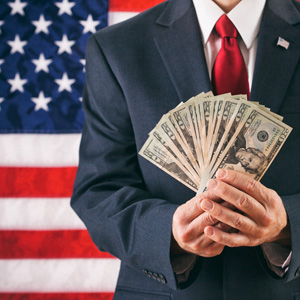DC federal court upholds limits on state political parties' use of soft-money donations

A federal court in Washington, D.C., has rejected a First Amendment challenge to the ban on state and local political parties’ use of unlimited, soft-money political donations for activities affecting federal elections.
A three-judge panel of the district court ruled on Monday in an opinion by Circuit Judge Sri Srinivasan, who was sitting on the district court panel, the Washington Post reports. The decision (PDF) upheld the last major remaining provision of the Bipartisan Campaign Reform Act of 2002, which is also known as McCain Feingold, according to the Post.
The lead lawyer challenging the restrictions, James Bopp Jr., had argued the 2010 decision in Citizens United had called into question a 2003 Supreme Court decision, McConnell v. Federal Election Commission, which had upheld the limits on soft-money contributions to political parties.
Citizens United had struck down restrictions that barred corporations from spending money on campaign ads in the days before an election. It also overturned part of McConnell that had upheld the federal restrictions on independent corporate expenditures.
“Plaintiffs misperceive the reach of Citizens United,” Srinivasan wrote. Citizens United concerned independent campaign expenditures and didn’t concern limits on contributions to political parties, he said.
Srinivasan also said there was “no salient distinction” between the current case and a 2010 case in which a U.S. Supreme Court summary affirmance upheld the soft money restrictions in an as-applied challenge to the law.
Currently, individuals can annually contribute up to $33,400 to any national political party and $10,000 to any state or local political party in what are known as hard money contributions. Funding from individuals above the statutory ceilings or funding from corporations can’t be used by political parties for federal elections, and are known as nonfederal or soft money, Srinivasan explains in the opinion.
The restrictions at issue in the current case ban state and local parties from using soft money for federal election activity. Bopp had argued the restrictions put political parties in a disadvantaged position to super PACs.
The decision can be appealed directly to the Supreme Court, which must decide the case, according to the Post. “We just believe they’re wrong, and we’re certainly appealing to the Supreme Court,” Bopp told the newspaper.
The case is Republican Party of Louisiana v. Federal Election Commission.



